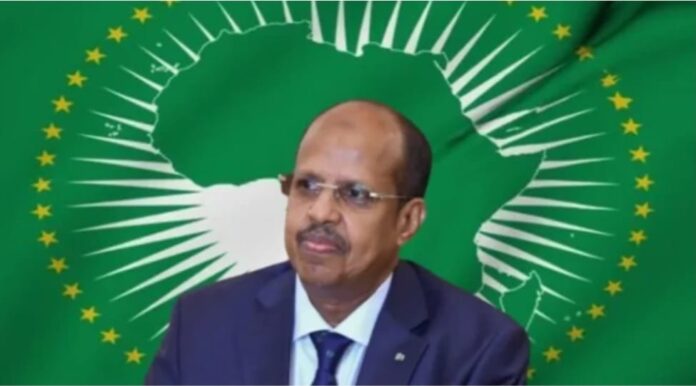
By Paul Ejime
Continental leaders at their 38th ordinary summit in Addis Ababa, Ethiopia, on Saturday, February 15, 2025, elected Djibouti’s Foreign Minister Mahmoud Ali Youssouf as the African Union Commission’s (AUC) chairperson for four years.
Youssouf replaces Moussa Faki of Chad, who has led the Commission since 2017.
Selma Malika Haddadi, Algeria’s Ambassador to Ethiopia and Permanent Representative to the African Union, was also elected as Deputy Chairperson.
With the position zoned to East Africa, Youssouf waited until the seventh round of balloting to obtain the mandatory 33 votes to clinch the post at the expense of two other contestants, Madagascar’s ex-Foreign Minister Richard Randriamandrato and Kenya’s former Prime Minister and veteran opposition leader Raila Odinga.
Haddadi also won in the 7th round, beating her North African rivals from Egypt and Morocco to replace outgoing Dr. Monique Nsanzabaganwa of Rwanda as Deputy Chairperson.
Odinga, the frontrunner for the leadership position before the summit, won the first round, and Youssouf led from the second round after the Madagascan candidate dropped out.
Saturday’s marathon balloting was preceded by the election of AUC Commissioners, including the re-election of Nigeria’s Ambassador Bankole Adeoye as Commissioner of Political Affairs, Peace and Security and Ghana’s Ambassador Amma Twum-Amoah as Commissioner of Health, Humanitarian Affairs and Social Development, both from West Africa.
Youssouf, the 59-year-old Djibouti diplomat, studied foreign languages in France and received advanced training in business management in the UK and Brussels. He served as his country’s ambassador to Egypt under three previous administrations before he was appointed foreign minister in 2005.
“If I am elected (Chairperson) of the African Union Commission, my priority will be financial management and governance,” he said in Rabat, Morocco, last December. “My goal will also be to mobilize internal funds. Djibouti has always been a source of trust and credibility, able to play a leading role in promoting stability and security…”
He will inherit a continental organization grappling with internal leadership challenges compounded by daunting continental and global problems, including insecurity, political and socio-economic instability, terrorism, violent extremism, civil and inter-state wars, general governance, and climate change concerns.
With active or simmering violent conflicts in Somalia, Sudan, South Sudan, Central African Republic, DR Congo, Mozambique, and part of Ethiopia, the AUC’s host country, and at least six of the 55-nation Member States – Chad, Sudan, Mali, Guinea, Burkina Faso, and Niger – under military dictatorships, the new AUC leadership under Youssouf have their job cut out for them.
The AUC replaced the Organisation of African Unity (OAU) in 2002.
Ejime is a Global Affairs Analyst and Consultant on Peace & Security, and Governance Communications





